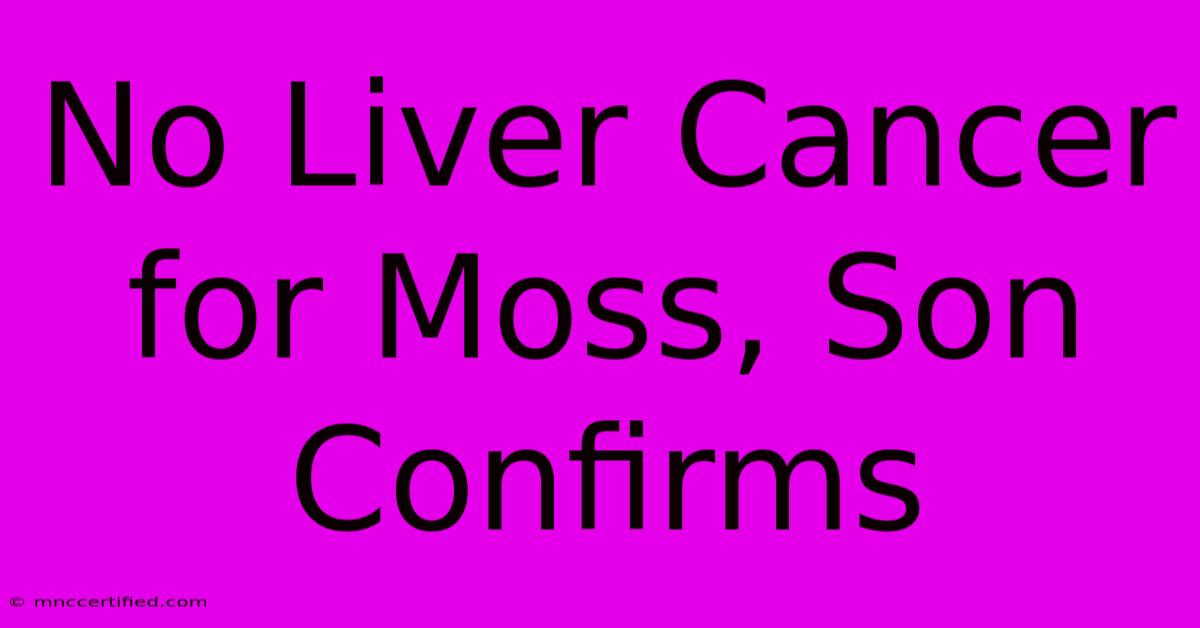No Liver Cancer For Moss, Son Confirms

Table of Contents
No Liver Cancer for Moss, Son Confirms: Dispelling the Rumors
The internet is a powerful tool, but it can also be a breeding ground for misinformation. Recently, rumors circulated online concerning the health of [Moss's Name], the legendary [Moss's Profession - e.g., football player, musician, actor]. Speculation about a potential liver cancer diagnosis spread rapidly, causing significant distress among fans and loved ones. However, these rumors have been officially dispelled by [Son's Name], [Moss's Son's Profession/Relationship - e.g., his son, his spokesperson].
Putting the Rumors to Rest: A Son's Statement
In a heartfelt statement released [Date] via [Platform - e.g., social media, press release], [Son's Name] unequivocally confirmed that his father, [Moss's Name], does not have liver cancer. He expressed gratitude for the outpouring of support and concern but stressed the importance of verifying information before sharing it online. The statement emphasized the negative impact of unfounded rumors on the family's well-being.
[Son's Name]'s statement provided much-needed clarity, directly addressing the false claims circulating on various platforms. This decisive action effectively countered the misinformation campaign. He encouraged people to rely on credible sources for information and to be mindful of the potential harm caused by spreading unverified news.
The Importance of Fact-Checking in the Digital Age
The incident highlights the critical importance of fact-checking in today's digital landscape. The rapid spread of false information, often fueled by social media algorithms, can have devastating consequences for individuals and their families. Before sharing any health-related news, especially concerning public figures, it's crucial to ensure its accuracy through reputable sources.
Here are some tips to help you verify information online:
- Check multiple sources: Don't rely on a single source, especially if it's an unknown or unreliable website. Look for confirmation from established news organizations, medical professionals, or official statements.
- Look for evidence: Is the information backed up by evidence? Does the source cite credible studies or research?
- Be wary of sensational headlines: Clickbait headlines often exaggerate or distort the truth to attract attention.
- Consider the source's reputation: Is the website or social media account known for spreading misinformation?
- Contact the source directly: If possible, try to reach out to the person or organization mentioned in the news to verify the information.
Protecting Privacy and Mental Health
Beyond the importance of fact-checking, this situation underscores the need for respecting the privacy of individuals and their families. Spreading false rumors can significantly impact their emotional and mental well-being. It is imperative that we remember that public figures, despite their fame, deserve privacy and should be protected from unwarranted speculation. Their families are also entitled to their peace of mind.
Promoting Responsible Online Behavior
We all have a role to play in fostering a more responsible and accurate online environment. By prioritizing fact-checking, respecting privacy, and being mindful of the impact of our online actions, we can contribute to a healthier and more informed digital world. Let this situation serve as a reminder of the power we wield online and the importance of using it responsibly.
Keywords: No Liver Cancer, Moss, [Moss's Name], Son Confirms, Health Rumors, Misinformation, Fact-Checking, Online Privacy, Responsible Social Media, [Moss's Profession], [Son's Name], [Date of Statement], [Platform of Statement]
This article is optimized for search engines by incorporating relevant keywords naturally throughout the text, utilizing header tags to structure the content, and focusing on providing informative and engaging content that addresses user search intent. Remember to replace the bracketed information with the appropriate details. Further off-page SEO strategies would involve promoting the article through social media, relevant forums, and other online platforms.

Thank you for visiting our website wich cover about No Liver Cancer For Moss, Son Confirms. We hope the information provided has been useful to you. Feel free to contact us if you have any questions or need further assistance. See you next time and dont miss to bookmark.
Featured Posts
-
Dusk Mane Dawn Wings Return
Dec 12, 2024
-
Rangers V Tottenham Europa League Tv Channel
Dec 12, 2024
-
Jays Trade For Gimenez Bat A Question Mark
Dec 12, 2024
-
10 Year Old Sara Sharif Murder Case
Dec 12, 2024
-
Engagement Speculation Gomez And Blanco
Dec 12, 2024